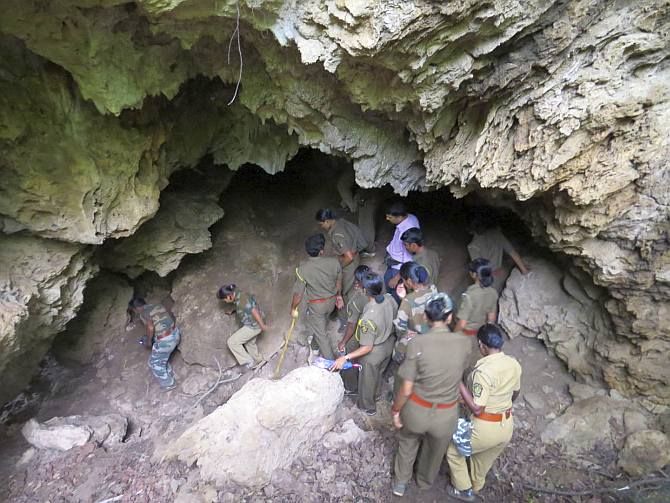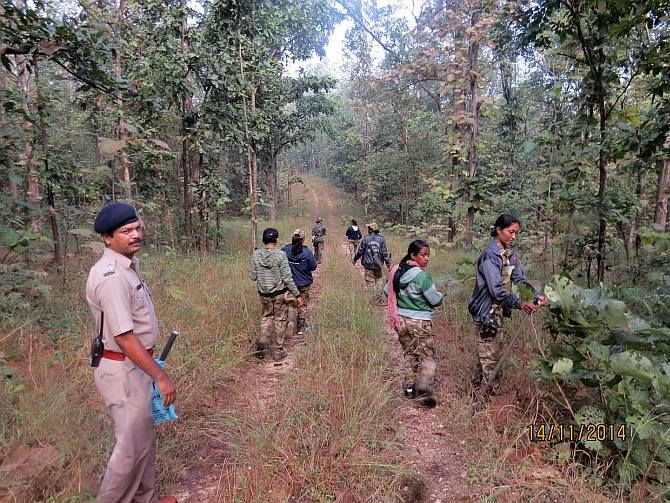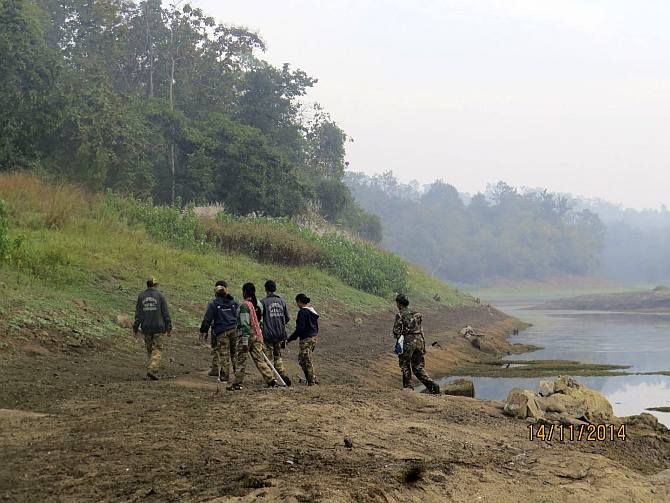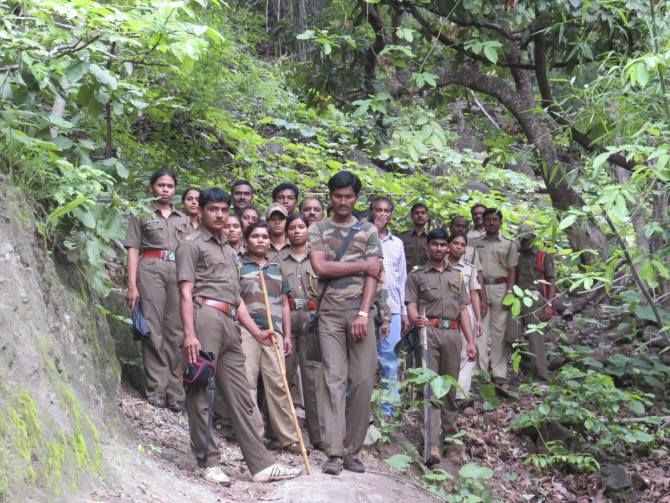In the jungles of the Pench National Park and Tadoba Andhari Tiger Reserve, 28 brave women walk 20 km every day.
They often come across tigers, leopards, bears, bison and other wild animals.
But there is another species far deadlier that often crosses their path: Humans.
Prasanna D Zore/Rediff.com reports on a mini women's army in India's fight back against poachers and hunters, which has shown promising results as latest figures show that tiger numbers are up 30 per cent.

Photograph: Courtesy, STPF_Pench Tiger Reserve
For a group of 28 women in the region around the Maharashtra-Madhya Pradesh border, saving tigers isn't just some fancy phrase; it's their life.

Aarati Fule (pictured, left), 24, is part of the Special Tiger Protection Force that patrols the Pench National Park on the border of Maharashtra and Madhya Pradesh and the Tadoba Andhari Tiger Reserve in Maharashtra.
In 2012, alarmed at India's dwindling tiger population, 13 tiger reserves were identified for raising, arming and deploying the STPF. The 28 women are part of the Pench-Tadoba team.
For eight hours a day, Fule and her colleagues walk inside the jungles – 20 to 25 km on average – where they often encounter wild animals.
But there is another species far deadlier than the tigers, leopards and sloth bears that often cross their path: Humans -- poachers and hunters.
There were 1,700-odd tigers left in India's wilds at last count; 66 of them died last year, mostly killed by poachers, and three have died already this year (two in Tamil Nadu and one in Karnataka), per the National Tiger Conservation Authority's data base that tracks tiger mortality. But per the latest figures just released by the environment ministry tiger numbers are up 30 per cent from 1,706 to 2,226 in the latest census.
"It's 24x7," Fule says, on the phone from Policemaar, Maharashtra, about her job. It includes ensuring the tigers in Tadoba and Pench can roam free of poachers' traps, guns and poisons. It also includes ensuring forest produce is not smuggled out. It also includes avoiding man-animal conflict, a common occurrence especially around Tadoba.
"Ours is a mini army to protect the wildlife," Aarati says.
A group of 14 women, a couple of beat guards and a range forest officer leave early at 6 am, and return by 2 pm. The second batch leaves when the first batch returns, and comes back by 10 pm.

Photograph: Courtesy, STPF_Pench Tiger Reserve
"Though timings are fixed, there is no order as to how things pan out," Fule says. "We venture out inside the jungle anytime of the day or night. If we come across poachers or those smuggling wood or forest produce, the routine goes upside down."
She says she enjoys her job too much to worry about work hours.
"My team and I have managed to save lots of animals from hunters and poachers," she says. "The STPF has helped create an environment of fear among poachers, hunters and smugglers. They now know that there is somebody who can confront them inside the forest any time of the day or night."
"Once we leave, we leave. The return schedule is never fixed."
No tiger has died of poaching in their area since the Pench-Tadoba STPF was raised. For this, the 28 women were honoured with a Special Tiger Award by Sanctuary Asia in December 2014.

Photograph: Courtesy, Yogesh Patel/ Sanctuary Photo Library
After graduating from the Nagpur University-affiliated Natwarlal Maneklal Dalal College in Gondia, Maharashtra, Fule had applied for the post of a forest beat guard. She wasn't selected.
It was at this time the STPF was raised.
"I applied for it, cleared the selection and joined the STPF two and half years ago," she says.
She and her STPF mates underwent a six-month rigorous training programme in Chandrapur near Tadoba.
The training gruelling physical training, as well as courses on forest management, protection of wildlife, forest laws, and how to handle poachers and smugglers.
Fule and her brave colleagues often run into poachers.

Photograph: Courtesy, STPF_Pench Tiger Reserve
"We have caught many people," she says, matter of fact. "We also make sure that hunters do not poison the animals' sources of water. We catch hold of them and hand them over to the local police station under whose jurisdiction any alleged criminal activity takes place."
In October 2014, STPF guard Satish Shendre was shot at by poachers while patrolling with his group.
"It was around 8 am. When we came to know about the incident we went inside the jungle and caught the poachers," Fule says. "Instances like these do not discourage or scare us. It is our job."
The only time her nonchalant voice betrays excitement is when asked about her encounters with wild animals.
"I have encountered leopards, tigers, bears, deer and bison inside the forest," she says. "I was very excited and happy when I saw a tiger in the jungle for the first time during patrolling. It was such a huge animal, standing right in front of me!"
"Aamchi sankhya pahunach te palun gela (The tiger ran off when it saw such a big group of women)!" she quips.
Since then, she and her colleagues have often come across big cats.

Photograph: Courtesy, STPF_Pench Tiger Reserve
"They don't bother us and we don't bother them," she says. "I enjoy being with the wild animals inside the jungle. People like you pay loads of money to come here and enjoy being with the wild life. People like us do it for free. In fact, the government pays us for touring the jungles!"
She laughs.
"That in itself makes us feel so happy."









